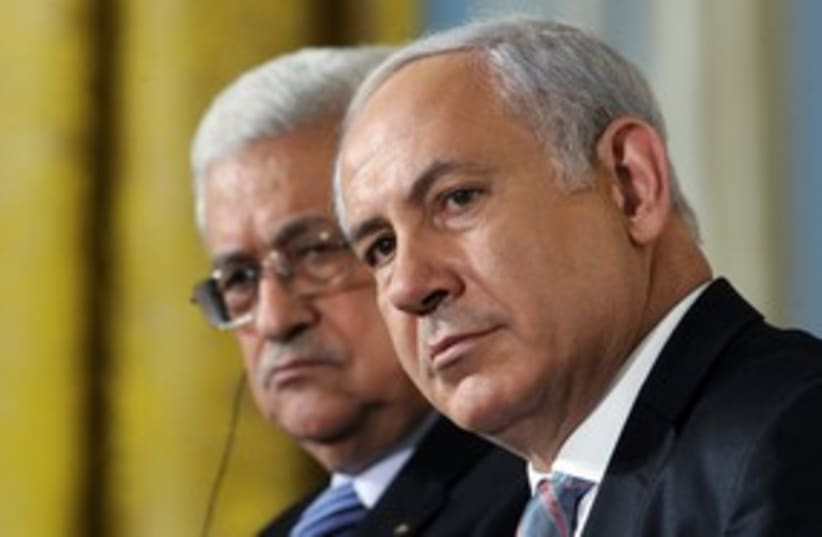RELATED:UK: Time running out for two-state solutionIsrael: Europeans are ‘irrelevant’ on peace process
Instead, Chief Palestinian negotiator Saeb Erekat has leaked information to the media, Netanyahu said. “He keeps talking, and talking and talking,” Netanyahu said.At a London press conference Palestinian Authority President Mahmoud Abbas had equally harsh words to say about Netanyahu. He complained that during the three meetings in Amman the Israelis had failed to put forward any proposals for the peace process.“We hope that Prime Minister Netanyahu is going to submit some proposal to us. We do not care what type of proposal. Maybe we’ll agree to it, maybe we’ll not agree to it but the main thing is that he should submit some kind of proposal to us,” Abbas said.“Unfortunately until now – and this goes until yesterday – no such proposal has been submitted to the Palestinians,” he added.Underneath the accusations that flew between the two leaders is a deep divide over the future of the talks.The Palestinians have insisted that the talks, which have taken place between Erekat and the prime minister’s envoy Yitzhak Molho, should adhere to the initial timetable of January 26th set by the Quartet, unless Israel agrees to halt settlement activity and stop Jewish building in east Jerusalem.Israel in turn has insisted that a three-month time-table had been set for such talks, but since the talks only started this month instead of in October, their true end date is April 3.“I hope that we can overcome this obstacle of January 26th so we can continue the negotiations,” Netanyahu told the Knesset Foreign Affairs and Defense Committee.During the three rounds of talks already held in Amman Israel presented the Palestinians with a document that listed 21 points that should be agreed upon by both parties to achieve a framework agreement, he said.“These are the issues that need to be resolved,’ Netanyahu said.The Palestinians, in turn, he said, have also put a paper on the table. “But it is the same paper that all Israeli governments have received from the Palestinians since Oslo started. They have not moved in their position not a millimeter and not a nanometer,” he said.Netanyahu renewed his call for Abbas to sit down with him face to face.“When the Jordanians approached us about starting negotiations, I was ready to go to Jordan,” Netanyahu said.He added that it was the Jordanians who stipulated that at this stage it was better for the talks to be between chief negotiators, in this case Erekat and Molho.“I am willing to meet Abu Mazen [Abbas] anywhere anytime. I am willing to go to Ramallah, even though it will drive my security people crazy. And I am willing to invite Abu Mazen to Jerusalem,” Netanyahu said.He added that with the exception of a few brief meetings in September 2010, the Palestinians have refused to negotiate with Israel for the last three years.Initially, Netanyahu said, he was told that the Palestinians had hoped the United States would deliver Israel to them without negotiations. Now, he said, he has been told that the Palestinians have refused to talk because the US will to deliver Israel to them.After the Knesset meeting, Yoaz Hendle, director of communication for the prime minister’s office said Israel viewed the renewed talks very seriously, and had put a lot of effort into them.“We came to the talks intent on advancing the peace process,” he said. “But there is a feeling that the Palestinians are trying to find all kinds of reasons to get out of them,” he said.
